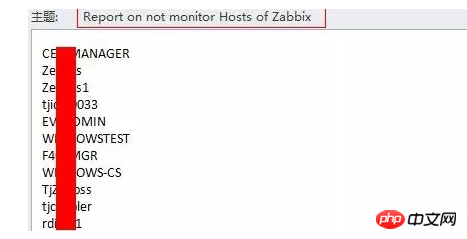 Backend Development
Backend Development
 Python Tutorial
Python Tutorial
 How to implement Zabbix-API monitoring in Python (with code)
How to implement Zabbix-API monitoring in Python (with code)
How to implement Zabbix-API monitoring in Python (with code)
The content of this article is about how to implement Zabbix-API monitoring in Python (with code). It has certain reference value. Friends in need can refer to it. I hope it will be helpful to you.

Friends who do operation and maintenance should know that the company's IDC computer room often has servers that are put on the shelf, taken off the shelf, reported for repair, and scrapped. If there are a large number of servers, it is easy to cause monitoring omissions.
Large Internet companies integrate monitoring systems and CMDB (asset management system | configuration management database system). When a new machine is launched, relevant information will be recorded in the CMDB. Zabbix will automatically link related information based on the information in the CMDB. Module, add|remove monitoring. Many small companies do not have an asset management system, but as the person in charge of monitoring, they should know which new machines have been launched every day and ensure that they can be added to Zabbix monitoring.
First of all, let me tell you the script idea:
1) Use the Nmap tool to scan the network segment and scan out the IP addresses that have been used.
2) Use Nmap to check whether the 3389 or 22 port of the scanned IP is open, and you can determine which ones are Windows machines and which ones are Linux machines.
3) Find the Linux host name through the ssh hostname command under Linux.
4) Under Windows, use the nmblookup -A command to find out the Windows host name.
5) Use a Python script to read the scan result file and write the host name into the list.
6) Use Zabbix python API to call the monitored host name and write it into the list.
7) Take the intersection of the two lists and use a for loop to determine which host names are not monitored.
8) Send an email to notify the person in charge of monitoring.
Below I will share the script I wrote in Python. Scan_machine.sh is the script I called using Shell to write about Nmap scanning. scan_hostname.log is the result of Nmap scanning, and the content inside is the IP host. name.
#!/usr/bin/env python#create by:sfzhang 20140820#coding=utf-8import os,sysimport jsonimport urllib2import datetime,timefrom urllib2 import URLError
nmap_cmd = "/shell/machine/scan_machine.sh"def runCmd(command):
global mail_cmd
mail_cmd = '''mail -s "Report on not monitor Hosts of Zabbix" shifeng_zhang88 < /shell/machine/result/result.txt'''
return os.system(command)runCmd(nmap_cmd)def nmap_host():
hostiplst = []
hostnamelst = []
f = file('/shell/machine/result/scan_hostname.log')
for line in f.readlines():
hostip = line.split()[0]
hostname = line.split()[1]
hostiplst.append(hostip)
hostnamelst.append(hostname)
hostnamelst.sort()
#print hostiplst
return hostnamelst
f.close()def zabbix_host():
zabbixhostlst= []
#based url and required header
url = "http://192.168.161.128/api_jsonrpc.php"
header = {"Content-Type": "application/json"}
#request json
data = json.dumps(
{
"jsonrpc": "2.0",
"method": "host.get",
"params":{
"output":["hostid","name"],
"filter":{"host":""}
},
#auth id
"auth":"Zabbix Auth ID",
"id": 1,
})
#create request object
request = urllib2.Request(url,data)
for key in header:
request.add_header(key,header[key])
#get host list
try:
result = urllib2.urlopen(request)
except URLError as e:
print "The server could not fulfill the request.",e.reason else:
reponse = json.loads(result.read())
result.close()
#print "Number of Hosts:",len(reponse['result'])
for host in reponse['result']:
#print "Host ID:",host['hostid'],"Host Name:",host['name']
zbxhosts=host['name']
zabbixhostlst.append(zbxhosts)
zabbixhostlst.sort()
return zabbixhostlst def main():
nmaphostlst = nmap_host()
zbxhostlst = zabbix_host()
diff = list(set(nmaphostlst) ^ set(zbxhostlst))
content = "\n"
nomonitorlst = []
if len(diff) != 0:
for host in diff:
if host in nmaphostlst:
nomonitorlst.append(host)
else:
sys.exit()
#print zbxhostlst
string = '\n'.join(nomonitorlst)
f = file('/shell/machine/result/result.txt','w')
f.write(string)
f.flush()
f.close()
runCmd(mail_cmd)if __name__ == "__main__":
main()Add the script to crontab, and each host will receive information about those hosts that have not been monitored.

Summary:
1) For Zabbix API related information, you can check the official details.
2) Through this script, you can know which hosts have not been monitored. I hope it will be helpful to everyone.
The above is the detailed content of How to implement Zabbix-API monitoring in Python (with code). For more information, please follow other related articles on the PHP Chinese website!

Hot AI Tools

Undresser.AI Undress
AI-powered app for creating realistic nude photos

AI Clothes Remover
Online AI tool for removing clothes from photos.

Undress AI Tool
Undress images for free

Clothoff.io
AI clothes remover

Video Face Swap
Swap faces in any video effortlessly with our completely free AI face swap tool!

Hot Article

Hot Tools

Notepad++7.3.1
Easy-to-use and free code editor

SublimeText3 Chinese version
Chinese version, very easy to use

Zend Studio 13.0.1
Powerful PHP integrated development environment

Dreamweaver CS6
Visual web development tools

SublimeText3 Mac version
God-level code editing software (SublimeText3)

Hot Topics
 1386
1386
 52
52
 Can vs code run in Windows 8
Apr 15, 2025 pm 07:24 PM
Can vs code run in Windows 8
Apr 15, 2025 pm 07:24 PM
VS Code can run on Windows 8, but the experience may not be great. First make sure the system has been updated to the latest patch, then download the VS Code installation package that matches the system architecture and install it as prompted. After installation, be aware that some extensions may be incompatible with Windows 8 and need to look for alternative extensions or use newer Windows systems in a virtual machine. Install the necessary extensions to check whether they work properly. Although VS Code is feasible on Windows 8, it is recommended to upgrade to a newer Windows system for a better development experience and security.
 How to run programs in terminal vscode
Apr 15, 2025 pm 06:42 PM
How to run programs in terminal vscode
Apr 15, 2025 pm 06:42 PM
In VS Code, you can run the program in the terminal through the following steps: Prepare the code and open the integrated terminal to ensure that the code directory is consistent with the terminal working directory. Select the run command according to the programming language (such as Python's python your_file_name.py) to check whether it runs successfully and resolve errors. Use the debugger to improve debugging efficiency.
 Can visual studio code be used in python
Apr 15, 2025 pm 08:18 PM
Can visual studio code be used in python
Apr 15, 2025 pm 08:18 PM
VS Code can be used to write Python and provides many features that make it an ideal tool for developing Python applications. It allows users to: install Python extensions to get functions such as code completion, syntax highlighting, and debugging. Use the debugger to track code step by step, find and fix errors. Integrate Git for version control. Use code formatting tools to maintain code consistency. Use the Linting tool to spot potential problems ahead of time.
 Is the vscode extension malicious?
Apr 15, 2025 pm 07:57 PM
Is the vscode extension malicious?
Apr 15, 2025 pm 07:57 PM
VS Code extensions pose malicious risks, such as hiding malicious code, exploiting vulnerabilities, and masturbating as legitimate extensions. Methods to identify malicious extensions include: checking publishers, reading comments, checking code, and installing with caution. Security measures also include: security awareness, good habits, regular updates and antivirus software.
 Python: Automation, Scripting, and Task Management
Apr 16, 2025 am 12:14 AM
Python: Automation, Scripting, and Task Management
Apr 16, 2025 am 12:14 AM
Python excels in automation, scripting, and task management. 1) Automation: File backup is realized through standard libraries such as os and shutil. 2) Script writing: Use the psutil library to monitor system resources. 3) Task management: Use the schedule library to schedule tasks. Python's ease of use and rich library support makes it the preferred tool in these areas.
 What is vscode What is vscode for?
Apr 15, 2025 pm 06:45 PM
What is vscode What is vscode for?
Apr 15, 2025 pm 06:45 PM
VS Code is the full name Visual Studio Code, which is a free and open source cross-platform code editor and development environment developed by Microsoft. It supports a wide range of programming languages and provides syntax highlighting, code automatic completion, code snippets and smart prompts to improve development efficiency. Through a rich extension ecosystem, users can add extensions to specific needs and languages, such as debuggers, code formatting tools, and Git integrations. VS Code also includes an intuitive debugger that helps quickly find and resolve bugs in your code.
 Golang vs. Python: Concurrency and Multithreading
Apr 17, 2025 am 12:20 AM
Golang vs. Python: Concurrency and Multithreading
Apr 17, 2025 am 12:20 AM
Golang is more suitable for high concurrency tasks, while Python has more advantages in flexibility. 1.Golang efficiently handles concurrency through goroutine and channel. 2. Python relies on threading and asyncio, which is affected by GIL, but provides multiple concurrency methods. The choice should be based on specific needs.
 Python vs. JavaScript: The Learning Curve and Ease of Use
Apr 16, 2025 am 12:12 AM
Python vs. JavaScript: The Learning Curve and Ease of Use
Apr 16, 2025 am 12:12 AM
Python is more suitable for beginners, with a smooth learning curve and concise syntax; JavaScript is suitable for front-end development, with a steep learning curve and flexible syntax. 1. Python syntax is intuitive and suitable for data science and back-end development. 2. JavaScript is flexible and widely used in front-end and server-side programming.



